Dagstuhl Seminar 24282
Automated Machine Learning for Computational Mechanics
( Jul 07 – Jul 12, 2024 )
Permalink
Organizers
- Hyunsun Alicia Kim (UC - San Diego, US)
- Lars Kotthoff (University of Wyoming - Laramie, US)
- Marius Lindauer (Leibniz Universität Hannover, DE)
- Elena Raponi (Leiden University, NL)
Contact
- Michael Gerke (for scientific matters)
- Susanne Bach-Bernhard (for administrative matters)
Schedule
The Dagstuhl Seminar 24282 was organized with the objective of bringing together the automated machine learning (AutoML) community with the computational mechanics (CoMe) community and finding new ways the two communities could help each other. More specifically, this seminar was trying to answer two questions:
- What are the problems the CoMe community encounters when applying machine learning (ML) methodologies, and how can the AutoML community help overcome them?
- What characteristics of CoMe benchmarks are currently not well supported by AutoML, and what limitations of AutoML tools are holding back their application in CoMe?
- How can applications in CoMe inform research directions in AutoML?
To search for an answer to these questions, the seminar was structured with a mixture of talks and group sessions. On one hand, the talks provided an overview of AutoML methodologies that could be valuable to the CoMe community, as well as examples of CoMe applications where ML methods have been applied to address common research questions and challenges. On the other hand, the group sessions offered the opportunity to delve into specific topics, either within individual communities or through cross-disciplinary discussions. The topics selected for the group discussions were intended to identify the barriers preventing the AutoML community from addressing common practical challenges in CoMe test cases, and, conversely, the obstacles hindering the adoption of AutoML methodologies by the CoMe community. More specifically, the topics discussed in groups were:
- Features and Problem Characterization;
- Optimization;
- Integration of Physics;
- Explainability;
- Benchmarks and constraints handling.
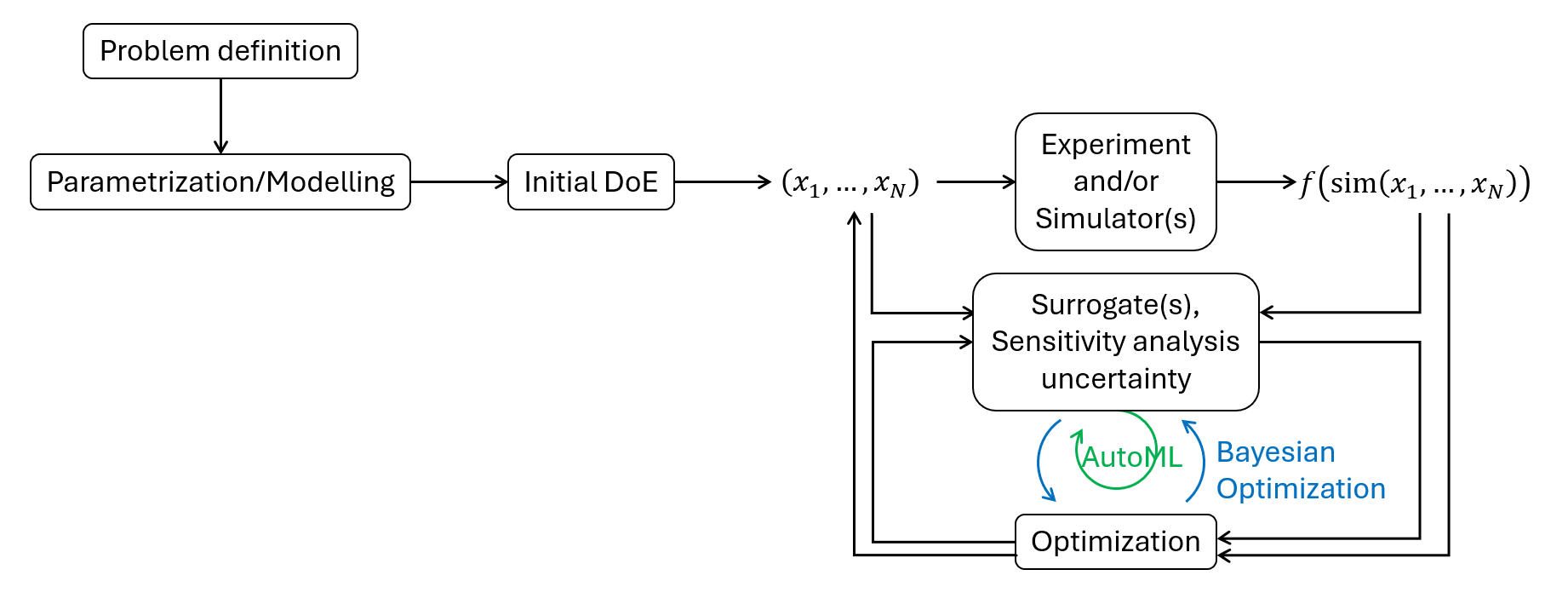
The seminar was then concluded by a plenary discussion on the outcomes of the given talks and group discussions. During this discussion, we were able to identify a general CoMe workflow that includes and exploits AutoML tools, see Figure 1. Moreover, we agreed that there are already many CoMe test cases the AutoML community can use to test their new methodologies, but these are badly disseminated. Therefore, in addition to the newly established collaborations between researchers belonging to the two different fields, one of the major outcomes of the seminar was the recognition that, to bridge the gap between AutoML and CoMe, the first crucial step would be to publish a review paper that compiles and categorizes the currently available datasets and benchmarks.
Organization of the Seminar
This small Dagstuhl Seminar brought together 23 researchers from both engineering and machine learning/optimization, representing both academia and industry. The group included a mix of senior and junior researchers, creating a diverse and collaborative environment.
Over the course of five days, the mornings featured 14 short presentations, each lasting 15 to 20 minutes. The rest of the seminar was organized in a dynamic and flexible manner, with activities ranging from scientific speed-dating and two-way surveys to the traditional trekking, as well as plenary and parallel discussions on topics chosen by the participants (see the complete seminar schedule in Figure 2). This flexible structure allowed for a more engaging and relaxed schedule, which was appreciated by all attendees. Discussions that began during the day often extended into the evening, where the cozy atmosphere of the Dagstuhl castle played a key role in making everyone feel comfortable during both work-related exchanges and more informal moments.
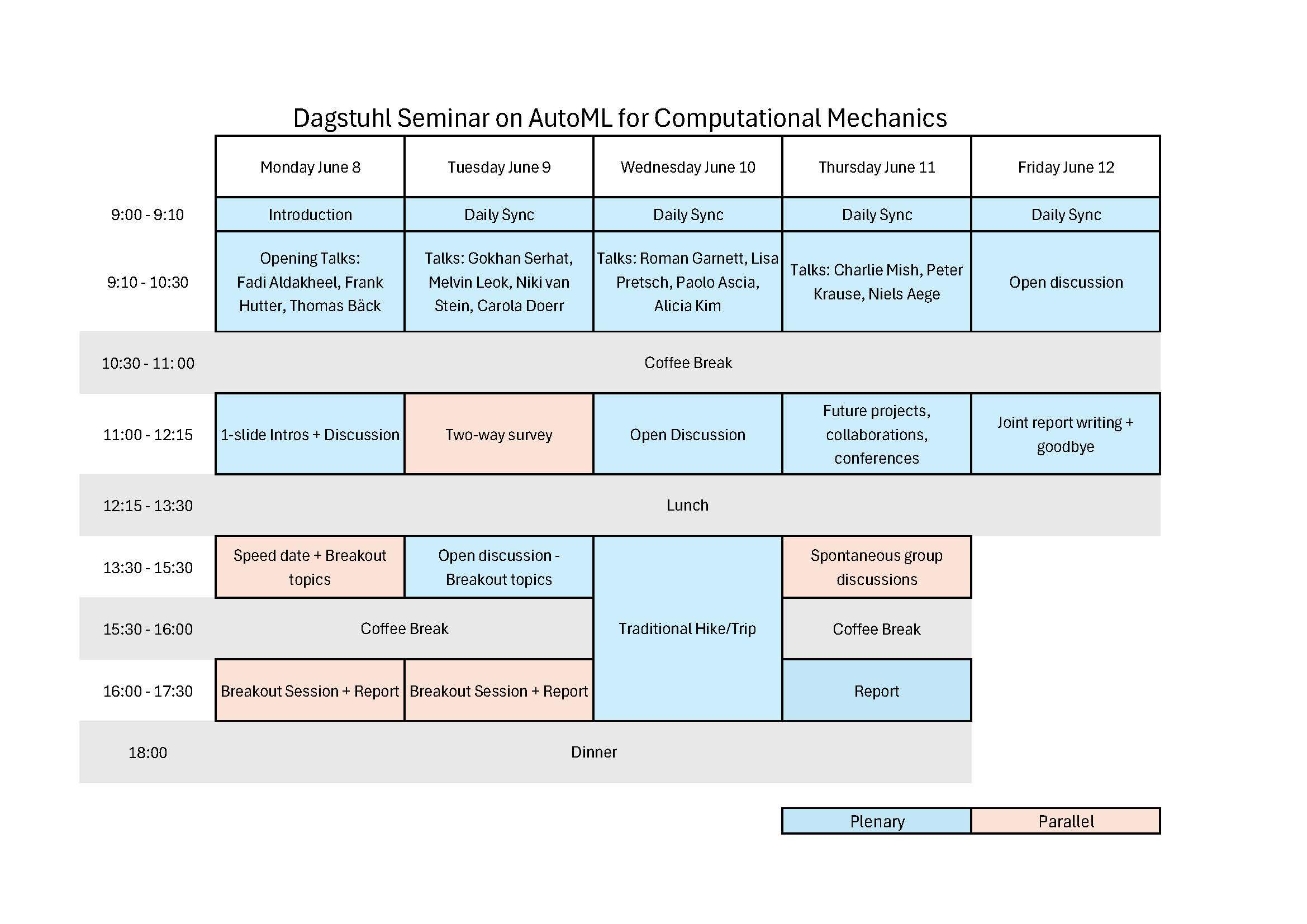
Outcome
Based on the survey results, the seminar was widely considered a great success by both the organizers and participants. Despite the participants needing some initial time to get used to the languages of the two different research communities, the seminar successfully bridged the gap between the machine learning and computational mechanics communities, fostering valuable cross-disciplinary dialogue. The event provided a platform for sharing cutting-edge research and insights, while also addressing the practical challenges faced when integrating automated machine learning (AutoML) into computational mechanics workflows.
The presentations were thought-provoking and initiated lively discussions throughout the seminar. The collaborative spirit extended beyond the formal sessions, with participants engaging in productive breakout sessions and working groups. These dynamic exchanges not only explored the current state of research but also laid the groundwork for potential future collaborations.
The event demonstrated the clear potential for synergy between these fields, and it is expected that the connections made during the seminar will continue to grow and lead to impactful advances. The organizers extend their sincere thanks to the Scientific Directorate and the Dagstuhl Center administration and staff for their precious support, which was instrumental in the seminar’s smooth execution and success.
 Elena Raponi, Lars Kotthoff, Hyunsun Alicia Kim, and Marius Lindauer
Elena Raponi, Lars Kotthoff, Hyunsun Alicia Kim, and Marius Lindauer
Machine learning (ML) has revolutionized Computational Mechanics, impacting all areas of engineering, from structural and fluid dynamics to solid mechanics and vehicle simulation. Computational mechanics employs numerical models and time- and resource-consuming simulations to replicate physical phenomena, usually with the final goal of optimizing the parameter configuration of the model with respect to desired purposes and functionalities of the system. In this context, ML algorithms can play a pivotal role by facilitating the creation of models that closely approximate the outcomes of simulations, expediting the identification of high-performing configurations. Nonetheless, the task of determining the most suitable design approach for a given undertaking is far from straightforward and heavily relies on human expertise.
Automated machine learning (AutoML) aims to reduce the need for experts to obtain effective ML pipelines. It offers off-the-shelf solutions that can be applied without prior knowledge in ML, allowing engineers to dedicate more time to domain-specific tasks. Regrettably, AutoML is underutilized in computational mechanics. There is almost no communication between the two communities, and engineers spend unnecessary effort selecting and configuring ML algorithms.
In light of this, the current Dagstuhl Seminar is dedicated to fostering cross-pollination between the fields of AutoML and Computational Mechanics. It aims to convene a curated selection of international experts, each hailing from diverse backgrounds and various application domains, encompassing computer science, machine learning, engineering, mathematics, operations research, and industrial applications. The overarching objectives are:
- Raising awareness of AutoML in the computational mechanics community.
- Unearthing strengths and challenges of applying AutoML in practice.
- Fostering a bilateral exchange that allows researchers to mutually benefit from their complementary goals and needs.
- What exactly does AutoML entail, and to what extent is it interpretable?
- In what ways can AutoML tools empower the Computational Mechanics community?
- What aspects of computational mechanics benchmarks currently lack robust support from AutoML, and what limitations of AutoML tools hinder their application in Computational Mechanics?
- How can applications in computational mechanics inform the research directions of AutoML?
We firmly believe that there exists significant potential for mutual support between the AutoML and Computational Mechanics communities, a potential that can be fully realized through the exchange of ideas. We are confident that these exchanges will culminate in collaborations that extend beyond the scope of the seminar.
Participants will have ample opportunities to engage in meaningful discussions through breakout groups, speed dating sessions, round tables, and more. Additionally, presentations by esteemed researchers from both the research domains are planned to delve into specific topics and ensure that all attendees can actively participate in the full spectrum of offerings. This seminar not only promises to be a platform for forging new connections but also for shaping the future landscape of the intersection of AutoML and Computational Mechanics.
 Hyunsun Alice Kim, Lars Kotthoff, Marius Lindauer, and Elena Raponi
Hyunsun Alice Kim, Lars Kotthoff, Marius Lindauer, and Elena Raponi
- Niels Aage (Technical University of Denmark - Lyngby, DK) [dblp]
- Fadi Aldakheel (Leibniz Universität Hannover, DE) [dblp]
- Paolo Ascia (TU München, DE)
- Thomas Bäck (Leiden University, NL) [dblp]
- Monica Capretti (University of Camerino, IT) [dblp]
- Carola Doerr (Sorbonne University - Paris, FR) [dblp]
- Elsayed Saber Elsayed Ibrahiem Elsayed (Leibniz Universität Hannover, DE)
- Helen Fairclough (University of Sheffield, GB)
- Roman Garnett (Washington University - St. Louis, US) [dblp]
- Frank Hutter (Universität Freiburg, DE) [dblp]
- Hyunsun Alicia Kim (UC - San Diego, US) [dblp]
- Lars Kotthoff (University of Wyoming - Laramie, US) [dblp]
- Peter Krause (divis intelligent solutions - Dortmund, DE) [dblp]
- Melvin Leok (University of California - San Diego, US) [dblp]
- Olaf Mersmann (HS Bund f. Öffentl. Verwaltung - Brühl, DE) [dblp]
- Charles Mish (UC - San Diego, US)
- Markus Olhofer (HONDA Research Institute Europe GmbH - Offenbach, DE) [dblp]
- Lisa Pretsch (TU München, DE)
- Elena Raponi (Leiden University, NL) [dblp]
- Thiago Rios (HONDA Research Institute Europe GmbH - Offenbach, DE) [dblp]
- Gokhan Serhat (KU Leuven - Bruges, BE) [dblp]
- Niki van Stein (Leiden University, NL) [dblp]
- Marc Zöller (USU GmbH - Karlsruhe, DE) [dblp]
Classification
- Artificial Intelligence
- Computational Engineering / Finance / and Science
- Machine Learning
Keywords
- automated algorithm design
- computational mechanics
- engineering applications of AI
- black-box optimization
- physics-informed machine learning

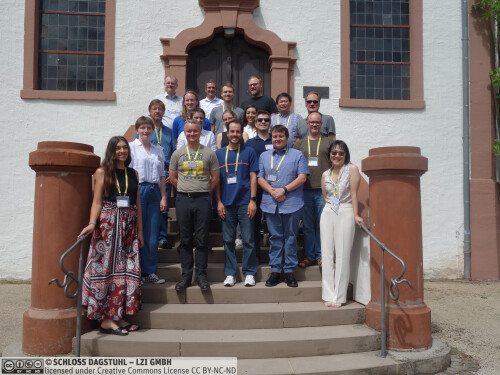
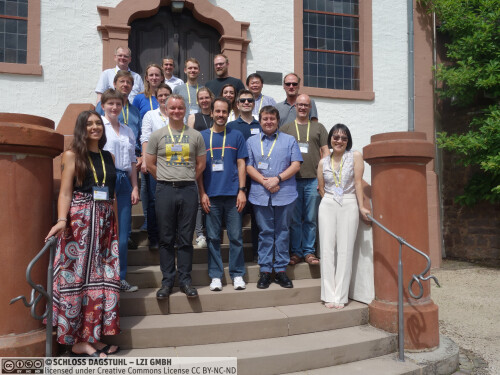
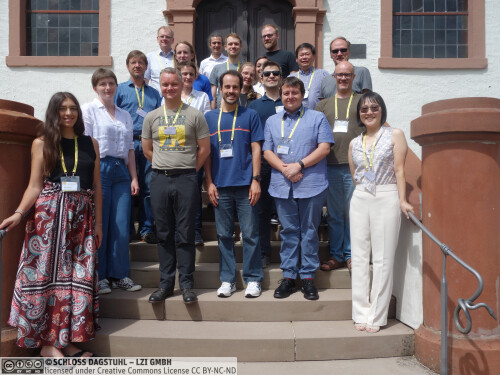
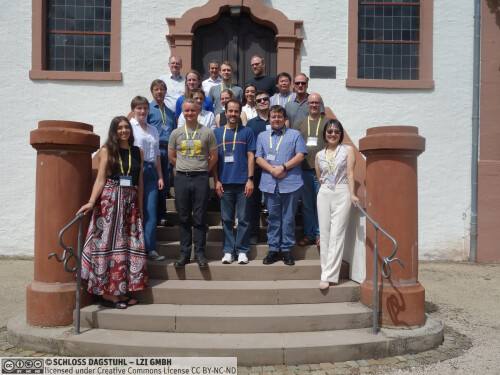
 Creative Commons BY 4.0
Creative Commons BY 4.0
